Articles in English GrammarThere are primarily 3 articles in the English Language. These include a, an, and the. Articles are a kind of adjective which are utilized before nouns or noun equals. The definite article (the) is mostly employed prior to a noun to emphasize the audience is familiar with the identity of the word. The indefinite articles (a, an) are employed prior to a broad noun or when the identification of the word is unknown. In some instances, a noun does not need an article. 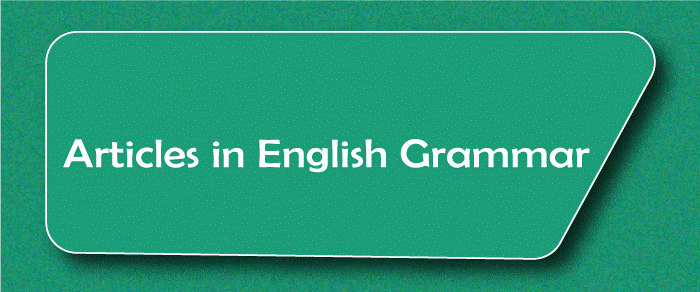
The definitions and list below summarise the basic use of articles as a guide. Continue reading for a more in-depth discussion of the guidelines as well as examples of when and how to apply them. The Definite Article
Indefinite Article
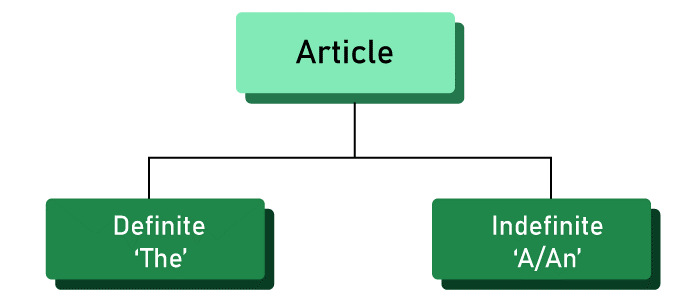
What are Articles?Articles are terms that specify whether a noun is specialized or generic. Consider the following scenarios: After a hard day, the mug of tea tasted very nice . We demonstrated through the article that it was one particular day that was prolonged and one particular mug of tea that was excellent. After a busy day, a mug of tea tastes especially wonderful . We've produced a generic statement by utilizing the article a, meaning that any mug of tea might taste excellent after a long day . There are two types of articles in the English Language: definite articles and indefinite articles. Let us now go over them in further depth . The Definite ArticleThe word the is the definite article. It limits the scope of a noun to a single item. "Are you coming to the celebration this weekend?" your friend could inquire. The definite article showcases that your buddy is alluding to a particular celebration that both are aware of. With single, plural, or uncountable nouns, the definite article can be employed. Here are a few instances where a definite article is utilized;
The Indefinite ArticleThere are two kinds of indefinite articles. It is the term a when it appears prior to the word that begins with a consonant. It's the term an when it appears prior to the word that begins with a vowel. The indefinite article indicates that a word refers to a general idea rather than a particular item. For instance, you could question a friend, "Should I carry a present to the party?" Your buddy will realise that you are not requesting a particular type of present or item. "I'm planning to bring pumpkin pie," your friend says. Again, the use of the indefinite article implies that the person is not indicating to a specific pumpkin pie. Your friend most likely does not yet had any pie. Only singular nouns use the indefinite article. Consider the following context-specific instances of indefinite articles:
Exceptions: Choosing An Or AnThere are some exceptions to the principle of putting a prior to the consonant-starting words and a prior to the vowel-starting words. The first character of the term honour, for instance, is a consonant but is not pronounced. The term honour begins with a vowel sound, irrespective of how it is spelled. Subsequently, we use an. Look at the below-mentioned sentence as an instance of this rule. My dad is a honest person. Incorrect . My mother is an honest person. Correct . Likewise when we employ a when the initial letter of a word is a vowel but is spoken with a consonant sound, as in the following example sentence: Helen is a U.s. citizen. - Correct . She is an United States citizen - Incorrect . This stands true with acronyms and initialisms, too: an LED screen, a US-based business, an Hr team, a URL Article Prior To An AdjectiveAn article can sometimes modify a noun that is simultaneously changed by an adjective. Article + adjective + noun is the most common word order. Whereas if the article is indefinite, select an or a based on the word that accompanies it quickly. Consider the following instances as a beginning point: Eliza will get a small present for her birthday. - Correct . I saw an amazing movie this weekend- Correct . Count Nouns, Non-Count Nouns, and ArticlesTo know how articles are employed, it is vital to realize that nouns can be count (can be tallied) or noncount (indefinite in quantity and can't be counted). In addition to this, count nouns can be singular (one) or plural (two) (more than one). Noncount nouns are always specified in the singular. For instance, if the fluid has been spilled on the desk, there could be one droplet (singular) or two or more droplets (plural) of liquid on the desk. In this instance, the word drop is a count noun since we can measure the number of drops. Based on the rules for count nouns, the term drop would utilize the articles a or the. Nevertheless, if we are talking about fluid splashed on the table in general, it would not be proper to count one or two fluids; there would just be fluid on the desk. Water or liquids or fluids is an uncountable noun. As a result, based on the rules for noncount nouns, the word liquid would not include an article or the, and not a. 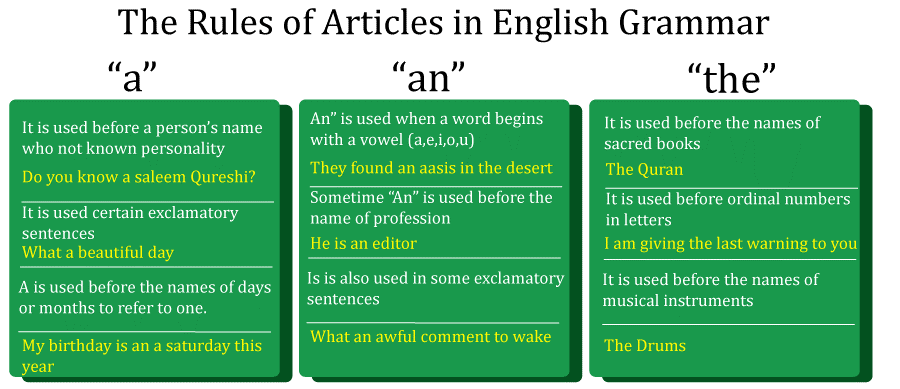
Rules For Usage of Definite and Indefinite ArticlesThe three specific rules that describe the usage of definite and indefinite articles are as follows. Rule #1 - Unknown specific identity: Use only the definite article an or a with a single count noun whenever the identity is unknown to the readers. Use an just prior the nouns that start with a vowel sound and a just prior the nouns that start with a consonant sound . To represent any unspecified member of a group, use the articles an or an.
To express one in a number, use the article an or an (in contrary to more). I have two kittens and a pup . Prior to the consonant sound, employ the article a, and prior to a vowel sound, employ the article an. a kid and an apricot ; Often an adjective is placed in between the article and the noun : A juicy plum, an unhappy kid . Some is the plural version of an or an. Employ some to denote an undetermined, limited quantity (but more than one) . 1 orange, a couple of oranges ; Rule #2 - When the reader knows the specific identity :When the audience knows the exact identity of a noun (either singular or plural, count or noncount), employ the definite article the, as in the below-mentioned circumstances : When a certain noun has been specified, utilize the article the. Today, I ate an orange. The orange was sweet and juicy . Whenever an adjective, phrase, or clause characterizing the noun explains or limits its identification, use the article the .
When a noun pertains to something or someone which is unique, use the article the.
Rule #3 - Everything or everything in general: No article should be combined with plural count nouns or any noncount noun that means all or in total.
Uncountable Nouns With Indefinite ArticlesUncountable nouns are nouns that seem to be hard or difficult to count. Uncountable nouns include intangibles (such as information or wind), liquids (such as milk or wine), and items that are too huge or plentiful to count (e.g., tools, sand, timber). Since these items cannot be enumerated, never use an or a with them?remember, the indefinite article is only used with singular nouns. Uncountable nouns, on the contrary, can be altered by words. Consider the following instances as a starting point : Kindly give us a water. - Incorrect Water seems to be an uncountable noun that should not be followed by the indefinite article. Kindly give us some water - Correct However, if you are describing the water in countable units (such as glasses), you can utilize the indefinite article.
Some nouns (for example, hair, noise, and time) can be countable or uncountable based on the context.
Using Pronouns with ArticlesPossessive pronouns can help to differentiate between specified and nonspecific items. Articles, as we have seen, also convey specificity. However, using a possessive pronoun as well as an article at the same time will confuse readers. Possessive pronouns include the terms his, my, our, its, her, and their. Pronouns shouldn't be used in articles. Consider the following examples. Why are you downloading the my document? - Incorrect . My and the are not appropriate altogether since they both serve to alter the same noun. Rather, based on the intended meaning, employ one or the other:
Absence Of ArticlesBefore specific nouns, articles are sometimes dropped entirely. The article is indicated but not actually present in these circumstances. This inferred article is sometimes known as a "zero article." The article is frequently dropped before nouns that allude to abstract ideas. Consider the following examples:
Several languages and ethnicities do not begin with an article. Consider the following example:
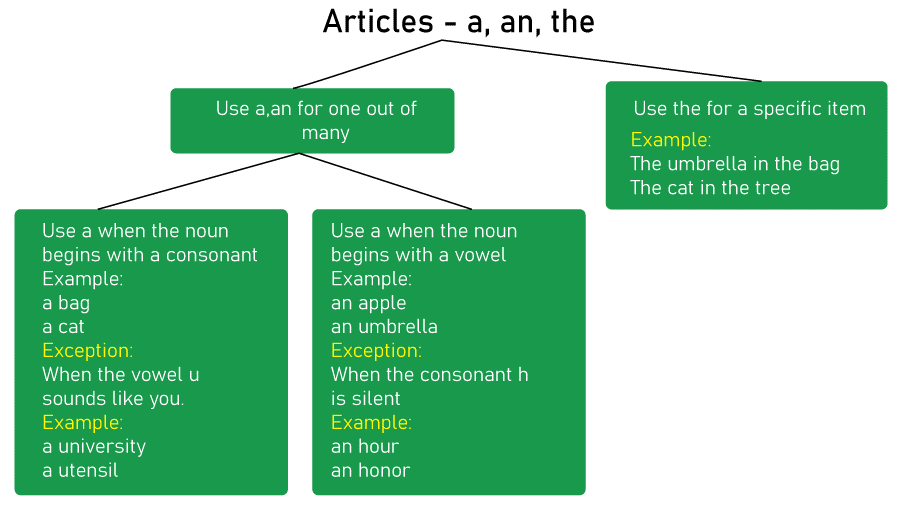
Articles are not required for sports or academic subjects. For example, consider the sentences below:
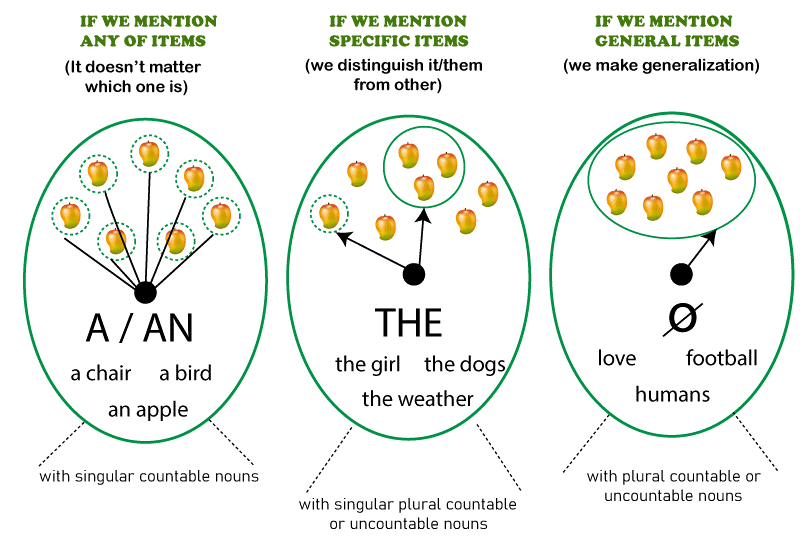
Additional Details Regarding Article UsageUse some to indicate an indeterminate, restricted amount of a count or noncount noun. My relative was seeking some guidance from a counsellor (guidance which is not general or about every aspect, but a limited amount of guidance) . I'd want some tea now (not tea in general, but a limited amount of tea. ) We might get snowfall today. Some snowfall would be beneficial to the environment (a certain amount of snowfall, as opposed to snow fall generally) . There are several water droplets on the desk (a limited quanity, but definitely more than one droplet) . Noncount nouns are those that cannot normally be counted. Here are some typical ones : Certain foods and beverages: Coffee, maize, cream, fish, wheat, fruit, frozen yogurt, lettuce, pork, milk, oil, macaroni, rice, salt, bok choy, sugar, tea, wine, vinegar, yoghurt . Specific nonfood items: wind, cement, petroleum, dirt, propane, gold, sheet, petroleum, foam, rain, gold, frost, soap, iron, wood, cloth . Most abstract nouns: advise, anger, beauty, confidence, courage, employment, fun, happiness, health, honesty, info, intelligence, knowledge, love, poverty, satisfy, truth, wealth . Areas of study: history, mathematic, chemistry, etc . Sports include soccer, rugby, baseball, and hockey, among others . Languages include Chinese, French, Russian, and English, among others . Other items include things for the home, fixtures, homework, jewellery, luggage, wood, machinery, postal, money, articles, poetry, research, scenery, traffic, transit, violence, climate, and things for work . Geographical names are perplexing since some require the others do not . Use the with: nations, vast regions, deserts, coastlines, oceans, beaches, gulfs, waterways, rivers, mountain peaks, and island groups .
Avoid using the with: roads, gardens, cities, states, districts, most nations, continents, bays, isolated lakes, isolated mountains, or islands .
Examples of Articles in Use
Next TopicModals in English Grammar
|
 For Videos Join Our Youtube Channel: Join Now
For Videos Join Our Youtube Channel: Join Now
Feedback
- Send your Feedback to [email protected]
Help Others, Please Share









